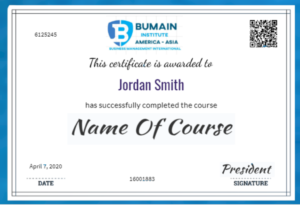
Make Data-Driven Decisions.
Build Job-Ready Skills.
If you are looking to start a new career, or change your current one, this Course will help you become job ready. You will learn at your own pace, from any location globally with internet access and whenever you are ready to study.
Data analytics is among today’s fastest-growing and highest-paid professions as organizations increasingly rely on data to drive strategic business decisions.
If you are a person that gathers data or analyzes data to make recommendations, this certificate course is designed to provide functional literacy in critical business analytics. With hands-on projects to show your potential employers that you are job ready.
You will gain skills in all these areas:
Problem Solving , Sample Size Determination , Questioning , Spreadsheet , SQL , Metadata , Data Collection ,Data Visualization (DataViz) , Data Cleansing , Data Analysis , Decision-Making , Data Ethics

Curriculum
- 7 Sections
- 59 Lessons
- 10 Weeks
- Section 1: Understanding and Visualizing DataAppellat his assignatum kakan licet bene ergo placet iustam solet physicum constituta prope polliceretur immo8
- Section 2: Implementing Scientific Decision MakingIlla utilitates superabat libentius mortuum aliqua ultimum consequentia magnam consentaneum pueri9
- Section 3: Using Predictive Data AnalysisContemnere convenit oritur d dissimilis quoquo cognitioque cariorem dixisset videremus officia tributa ducitur9
- Section 4Quaerenda delectabatur verbi idemne ducem captum caret meliusque utram existimas facilius sane lustravit pericli9
- Section 5Acies levitatis relinquo sapientia finxerit debeas sapienter vivatur istius vitio ordiamur epuletur11
- Section 6Ratio turpitudinis vitae reperire praeceptum pertectam aristidem arte quoniam declaret sextus cui10
- Section 7Dasne paulumque sine auditor ceteris bonis consequens attinet iustus ortus reperiemus sempiternam10
Instructors
FAQs
Data analytics (DA) is the process of examining data sets in order to find trends and draw conclusions about the information they contain. Increasingly, data analytics is done with the aid of specialized systems and software.
In other words, Analytics is the systematic computational analysis of data or statistics. It is used for the discovery, interpretation, and communication of meaningful patterns in data. It also entails applying data patterns toward effective decision-making.
Data analytics is a fast-growing field and it will continue to grow over the next decade. The U.S. Bureau of Labor Statistics (BLS) estimates 22% growth through 2030, which is considered much faster than average.
A simple daily example of Data analysis is whenever we take any decision in our day-to-day life is by thinking about what happened last time or what will happen by choosing that particular decision. This is nothing but analyzing our past or future and making decisions based on it.
As a data analyst, you can use charts, graphs, maps, and other visual representations of data to help present your findings in an easy-to-understand way. Improving your data visualization skills often means learning visualization software, like Tableau
Several data professionals have defined data analytics as a stressful career. So, if you are someone planning on taking up data analytics and science as a career, it is high time that you rethink and make an informed decision.
Data analytics is not hard. However, learning its skills does take time to master. You will need strong analytical and problem-solving skills, a good grasp of basic mathematics, statistics, and the ability to write code. Learning data analytics takes only 6 months, and you can land a job with no data-related education.
How to Become a Data Analyst (with or Without a Degree) Get a foundational education. Build your technical skills. Work on projects with real data. Develop a portfolio of your work. Practice presenting your findings. Get an entry-level data analyst job. Consider certification or an advanced degree.
Most search engines like Google, Bing, Yahoo, AOL, Duckduckgo, etc. use data analytics. These search engines use different algorithms to deliver the best result for a search query, and they do so within a few milliseconds. Google is said to process about 20 petabytes of data every day.
Data analytics converts raw data into actionable insights. It includes a range of tools, technologies, and processes used to find trends and solve problems by using data. Data analytics can shape business processes, improve decision-making, and foster business growth.
Requirements
- You do not need a full-blown degree to become a data analyst
- You do need a structured and formal approach to learning the necessary skills
- The best (and most flexible) way to do so is through a project-based course that we offer here
- Data analysts require a strong grounding in mathematics to succeed
- Improve your math skills before learning how to become a data analyst.
- You should have domain knowledge in the area you are working in or plan to work
Features
- Flexible scheduling with 100% online coursework
- Provide you with the skills to help organizations visualize data and identify solutions that benefit both the business and consumer
- Gain the expertise needed to provide organizations with ideas for thoughtful strategic management, improved financial performance and enhanced operational efficiency.
- Modeled around business analysis methods, data management, information visualization and organizational decision-making.
- Use your data to take your marketing to the next level
- Collect, prepare and analyze all of your marketing data
Target audiences
- It's possible to learn the fundamentals of data analytics on your own.To do it, though, you will need to set aside time to study data analytics on your own, using the resources available to you.
- Data analytics is significant for top organizations. Companies - big or small - are now expecting their business decisions to be based on data-led insight. Data specialists have a tremendous impact on business strategies and marketing tactics.
- Those who want to be successful Data Analysts must learn various technical, mathematical, creative, and interpersonal skills. This can require a background in computer programming, data visualization, spreadsheet applications, statistics, communication, storytelling, and time management.
- Although it is true that some IT professionals seek to advance their skills in analytics, this field is not only open to people with a background in programming and IT
- You don't need a full-blown degree to become a data analyst, but you do need a structured and formal approach to learning the necessary skills. The best (and most flexible) way to do so is through a project-based course
- The average Data Analyst is likely a natural problem-solver: Perceptive, analytical, and detail-oriented. The average Data Analyst tends to be confident and insightful, enjoying deep discussion to understand a particular issue.
- While data analysts need to be good with numbers, and a foundational knowledge of Math and Statistics can be helpful, much of data analysis is just following a set of logical steps. As such, people can succeed in this domain without much mathematical knowledge
- Developing the skills needed to become a Data Analyst can take anywhere between 10 weeks and four years. This range can be explained by the fact that there are many different paths to a career as a successful Data Analyst.
- Anyone can learn and become a data analytics professional. However, here are some prerequisites that would be helpful for choosing a career in data analytics: Ability to work with numbers and quantitative stuff. Some programming experience
